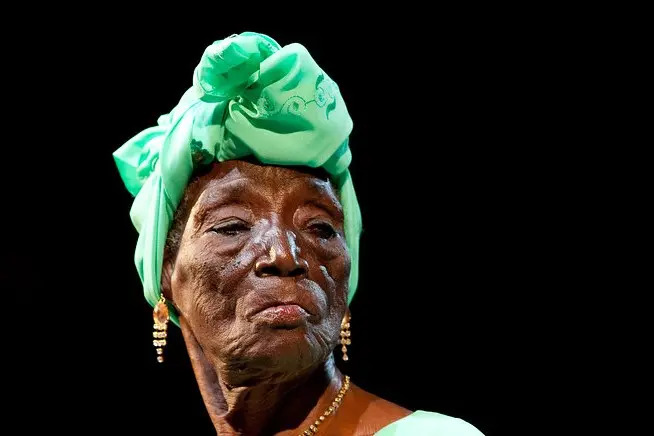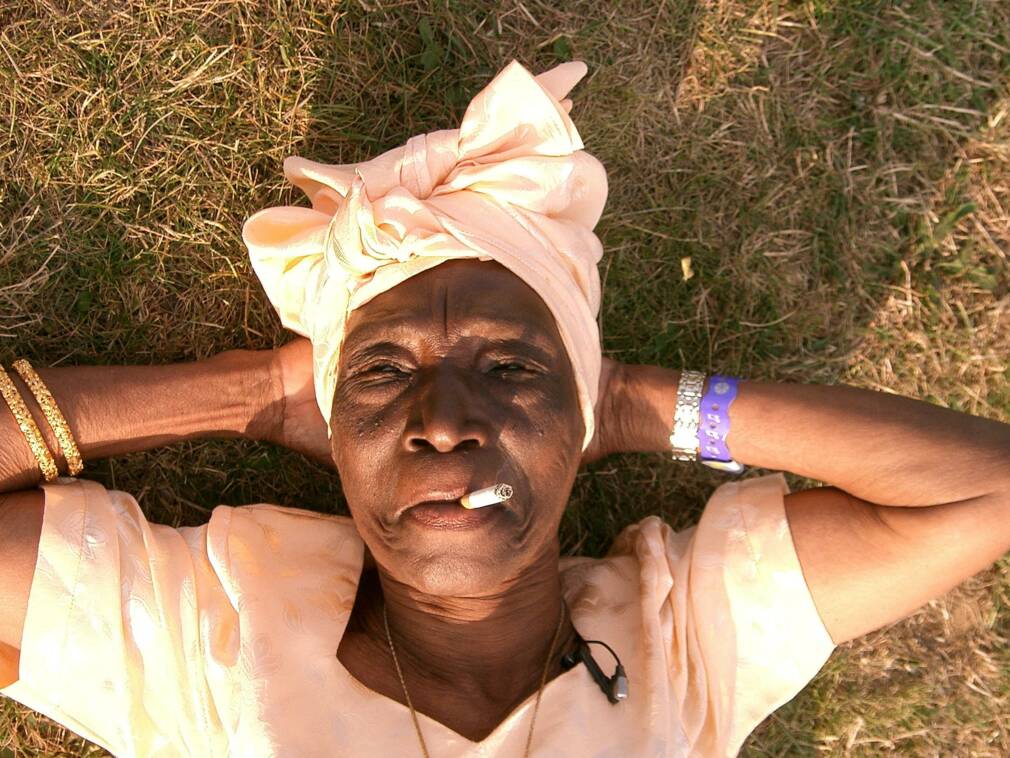“Bi Kidude?You can’t mess around with this woman!” exclaims Maryam “Mim” Suleiman the metallurgist turned musician when we connect to discuss the legend of Bi Kidude, the late Zanzibari artist who was performing even as a centenarian.
Kidude who died in 2013 is synonymous with Tanzanian Taarab music, the melange of East African and Arab music and poetry as miscellaneous as the coastal Swahili language in which it is commonly composed.
Born in time of the rupee
An almost folkloric character, Kidude was born Fatuma Binti Baraka sometime around 1910 or as she would recollect “around the time of the rupee.” The daughter of a coconut seller, she grew up in the village of Mfagimaringo and legend has it that one of her first acts of rebellion was running away from Koranic school at the age of ten. Inspired by the bold music and artistry of feminist and anti-colonial activist Siti binti Saad alongside the Egyptian firquah orchestras, Kidude’s wanderings continued and she crossed the water to Tanzania by dhow and began travelling around East Africa on foot (she would scorn shoes throughout her life) to pursue her own alternative education, singing and collecting songs along her way.
Returning home to Zanzibar she married and divorced twice, and unable to conceive, became involved in Unyago coming of age ceremonies – the rite of passage in which teenage girls receive a social and sexual education. It was at this time Fatuma Binti Baraka became Bi Kidude (Kiswahili for “Little Granny”) for her diminutive stature and surrogate parenting, and throughout her storied life Kidude would have many freelance gigs as a healer and apothecary, henna artist, and of course a musician.
Settling in the Shangani quarter of Zanzibar’s metropolis, Kidude began frequenting Taarab social clubs and immersing herself in the culture of female led taarab, the liberated lyrics of which frequently call out men for their sexual behaviour in a bold challenge to patriarchy. Gaining attention and some degree of notoriety, she became a local celebrity but remained relatively unknown outside Zanzibar.

That would remain the case until the 1980s which is when Mim Suleiman got her first glimpse of the senior singer.
“I’ll never forget it. We were living in Stone Town in Zanzibar ” Mim begins (in awe at the memory). “There was only one television channel and we were watching it and there were some elders talking to a singer. She was in her seventies then and was being interviewed and I was just watching her and I was… mesmerised.. by her.”
Despite Kidude’s appearance on television, Mim is quick to corroborate that Kidude wasn’t particularly valued and was even ridiculed at this time. Her rebellious artistry and refusal to observe purdah meant Bi would bump up against conservatism throughout her life and be labelled “haram” by those who “still don’t know what they had”, insists Mim.
Kidude was on the move once again though, and a revival of interest (and long overdue respect) for her interpretation of the Taarab repertoire would facilitate a series of tours beginning with The Sahib El-Ahri Band, and later the Twinkling Stars, during which Kidude lit up stages in Europe, Scandinavia, Japan, the Middle East and Southeast Asia.
Recognised in 2005 with a WOMEX award, Kidude’s story arc of international success in later life like that of The Buena Vista Social Club, would inspire two films As old as my tongue and I shot Bi Kidude by documentary maker Andy Jones, and it was as she reached her sunset that Mim Suleiman, now living in the UK, realised she had to try and meet her.
Mim had now eschewed science for music, and gained a new appreciation for Kidude; “I really understood more of her when I became a musician. Her strength, her stamina, how big she became when she performed, she just makes me cry” Mim takes up the story before continuing; “And I just thought that I need to know more about this woman, she’s getting older!”
Transmission
And so, connecting with Andy, Mim travelled to Zanzibar in 2013 to pay her respects to the now ailing Kidude; “I just serenaded her, I knew I was never going to get another time. She also knew she didn’t have much time left” Mim explains, and indeed Kidude would die just three weeks later.
“She was an authentic artist. She was a healer, she was… (Mim runs out of fingers as she tries to do justice to the woman she feels so lucky to have met). “The energy she possessed, her fearlessness” Mim stops at the superlativeness.
Mim likewise is a polymath, writing a cookbook, producing films including her feminist road movie “East Africa’s first road movie with women behind the wheel” uSISTA and of course writing her own music which she performs both acoustically and electronically.
As our conversation hones in on Bi’s back catalogue Mim mentions “Muhogo wa jang’ombe” backed by the iconic Culture Music Club with their typically Taarab front line of violins, zither and percussions. “I love the cheeky meaning” Mim says of the poetic lyrics which extol the value of hard work via metaphor, all delivered by Kidude with her trademark strength.
Opening with the flex “I am not afraid of the cooking spoon when it comes to cooking cassava” Bi sings;
Muhogo wa jang’ombe, sijauramba mwiko
(I am not afraid to touch the Jang’ombe cassava, I am not afraid of superstitions)
Usitukane wakunga, na uzazi ungalipo
(Do not insult midwives, as you may need them during childbirth)
Kaditamati naapa, muhogo sitonunua
(I swear on my honour, I will not buy this cassava)
Haikuwa Maimuna, aliyekwenda ung’oa
(It was not Maimuna who went to uproot it)
Kapata tete kuanga, na ugonjwa wa shurua
(She is suffering from diarrhoea and stomach cramps after eating the cassava)
Mim also tips me off on a clip of Kidude drumming with a vigour that belies her age which brings us to the final surprising footnote in this biography, this centenarian percussionist’s influence on Singeli.
Just as Kidude mostly reworked the compositions of Siti binti Saad, so are today’s DIY Singeli musicians upcycling Kidude’s music as pitched up loops, borrowing Unyago rhythms and delighting in breaking all the rules, much as Kidude did herself.
With a myth that only increases, our conversation concludes with the promise of more; “I hear new stories about her all the time” Mim laughs, before signing off on a fascinating deep dive into the life and legacy of an artist as authentic as she was original.
